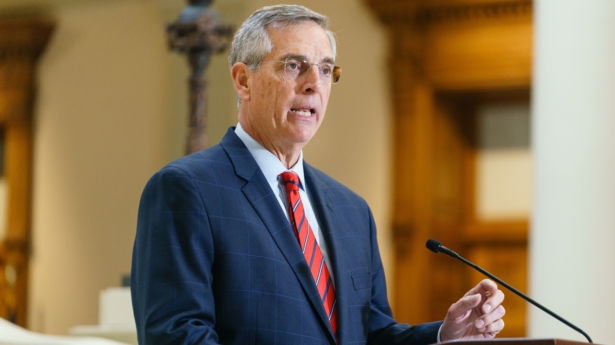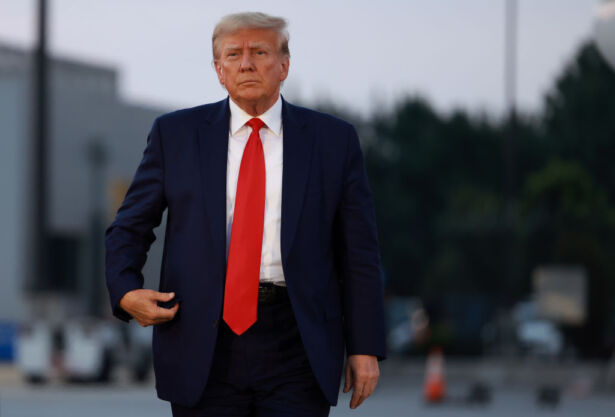ATLANTA—Former Trump White House chief of staff Mark Meadows told federal court in Atlanta that because his involvement in the disputed presidential election in Georgia was related to his job as a White House official his case should be tried in federal court.
The Aug. 28 hearing is being closely watched because this is the first time that substantive arguments have been made in court in any of the four criminal cases that have been brought against former President Donald Trump and his fellow defendants this year.
Some liken the hearing today to a mini-trial for President Trump and his co-defendants and speculate that the treatment Mr. Meadows receives in federal court will be a bellwether for how the various Trump-related prosecutions will proceed.
Mr. Meadows was testifying in a bid to have Georgia racketeering charges pending against him that are related to President Trump’s efforts to contest the state’s 2020 election heard in federal court, as opposed to state court in Fulton County where they originated.
The testimony took place before federal Judge Steve C. Jones of the Northern District of Georgia, who was appointed in 2011 by President Barack Obama.
President Trump, Mr. Meadows, and 17 co-defendants were indicted by a state grand jury in Fulton County on Aug. 14 over the former chief executive’s challenge to the election.
Prosecutors have focused on what was said in a Jan. 2, 2021, telephone conversation between President Trump and Georgia Secretary of State Brad Raffensperger in which they discussed, among other things, the vote count in the state and what options the two officials had available to them. Prosecutors say President Trump and others unlawfully attempted to interfere in the electoral process, an accusation he adamantly denies.

Charges against the cohort of defendants range from violating Georgia’s Racketeer Influenced and Corrupt Organizations (RICO) Act, soliciting the violation of an oath by a public officer, conspiracy to commit forgery in the first degree, and conspiracy to commit filing of false documents.
Mr. Meadows himself is charged with one count of violating the Georgia RICO Act and one count of solicitation of violation of oath by a public officer.
The legal language in the indictment (pdf) specifically alleges that on Jan. 2, 2021, Mr. Meadows “unlawfully solicited, requested, and importuned … Raffensperger, a public officer, to engage in conduct constituting the felony offense of Violation of Oath by Public Officer, O.C.G.A. §l6-10-1, by unlawfully altering, unlawfully adjusting, and otherwise unlawfully influencing the certified returns for presidential electors for the November 3, 2020, presidential election in Georgia.”
Mr. Meadows filed a notice of removal in federal court in Atlanta on Aug. 15. On Aug. 18, he filed a motion asking the court to dismiss the state charges, arguing he is immune from state prosecution under the U.S. Constitution’s Supremacy Clause, which elevates federal law over state law.
In other words, Mr. Meadows is arguing that he cannot be prosecuted in state court because whatever he did, it was done in his official capacity as a federal officer, and he has federal defenses available to him.
Under federal law, cases filed in state court can be removed, or transferred, to a federal district court that has jurisdiction over the same geographic area. A defendant files a notice of removal in federal court, which has the effect of transferring the case to federal court on a provisional basis. The defendant also notifies the state court and the other parties. A hearing follows in federal court, and the judge rules on whether to keep the case in federal court. If removal is denied, the case is remanded back to state court.
The case can remain in federal court only if that court would have had subject matter jurisdiction to begin with. One of the commonly used reasons for removing a case is that it implicates the U.S. Constitution or a federal statute. If the case remains in federal court, then it will be tried in that forum according to the laws of the state.
Part of the Job
The attorney for Mr. Meadows was George J. Terwilliger III, who was U.S. Deputy Attorney General from November 1991 to January 1993, serving briefly as acting attorney general near the end of that period.
Mr. Terwilliger said during the hearing that the case should be heard in federal court because everything Mr. Meadows did was under color of his official duties as chief of staff for the president of the United States.
In his direct testimony, Mr. Meadows said he worked very long hours in his job and that there was overlap between his official White House duties and monitoring what was happening in the election. He attended meetings either as a principal or as an observer responsible for reporting back to the president and taking notes so he could follow up on specific matters. President Trump’s campaign and election-related issues came up, he said.
Mr. Meadows said that he served as the busy president’s gatekeeper and that one of his key functions was to manage his boss’s time and to call meetings to a close.
Some campaign developments were related to his job because they involve federal policy and it was his responsibility to be aware of the potential impact on federal policy, he testified.
Mr. Meadows said he often didn’t know why the president wanted something, like, for example, a telephone number, but it was part of his job to obtain that information.
U.S. Department of Justice (DOJ) prosecutor Anna Cross cross-examined Mr. Meadows at length, suggesting repeatedly that the things he did on the job were not actually federal matters.
Mr. Meadows pushed back and provided examples. He said his visit to Cobb County, in which he took time off from his family Christmas gathering, was to observe the recount process there in his official capacity. Related discussions with Mr. Raffensperger were also carried out in his official capacity, he said.
The federal government and the president of the United States have an interest in knowing that elections are free and fair and being properly administered, he said. He repeated the statement later in the cross-examination.
Ms. Cross said that three of President Trump’s attorneys were present on the call with Mr. Raffensperger and that they were not federal employees.
Mr. Meadows said he was not certain if the lawyers worked for President Trump personally, for his campaign, or the federal government.
Ms. Cross pressed the witness on the particulars of the call and on other events in which Mr. Meadows participated, questioning whether they were legitimately related to federal government business.
Mr. Meadows said not everything he did regarding Cobb County was requested by President Trump—he looked into these things to be situationally aware and to be able to anticipate any questions the president might have, which was part of his job.
He said that at one point, he was being barraged with information after Election Day on election irregularities and that it was part of his job to make sure that information the DOJ needed got to it, and that information the Trump campaign needed got to it.

Mr. Meadows compared himself to the telephone operator on the long-running 1960s sitcom, “The Andy Griffith Show.” He said it was his responsibility to plug the right cord into the right receiver.
Ms. Cross asked him if he believed that the widespread allegations of fraud were valid or invalid. Mr. Meadows replied that he didn’t have enough information to answer that question.
Mr. Meadows discussed the allegation that he sent a text message asking if Fulton County’s signature verification procedure could be sped up and whether the Trump campaign could pay for the process. He said that generally such things are not paid for with taxpayer dollars.
Mr. Meadows said there was a presidential interest in “making sure you have an accurate and fair election. All of us as Americans want to make sure our vote counts, that it’s a free and fair election.”
He said there were other issues that would have “a federal nexus,” but the judge cut him off, saying he didn’t need to elaborate.
“The president of the United States often makes recommendations on legislation that comes up on elections, that they be safe and secure,” he said.
An event referred to as Act 19 in the indictment was discussed.
It was a reference to a December 2020 meeting with White House staffer John McEntee in which President Trump and Mr. Meadows allegedly asked for “a memorandum outlining a strategy for disrupting and delaying the joint session of Congress on January 6, 2021.” The strategy involved having Vice President Mike Pence “count only half of the electoral votes from certain states and then return the remaining electoral votes to state legislatures,” in the words of the indictment.
Mr. Meadows said he didn’t remember this act and would have been surprised if he had been involved in it because it was the kind of thing that would have gone to White House counsel, and Mr. McEntee, who dealt with personnel matters, was not a lawyer
“Me asking John Entee for this kind of a memo did not happen,” Mr. Meadows said.
Mr. Meadows said it was part of his job to deal with campaigns because they wanted to use up so much of the president’s time. As a gatekeeper he had to negotiate with them about how much time the president would devote to them, he said.
Mr. Meadows was asked if he had ever been accused of violating the Hatch Act, a federal statute that limits certain political activities of federal employees.
After he had remarked that someone running for office in North Carolina was a good candidate, Mr. Meadows asked for an ethics ruling because someone said this violated the law. The ethics ruling stated he had not broken the law, but it was suggested he wouldn’t have had a problem if he had worded his statement differently.
He also said that at one point in transit to a rally he was present on an airplane with the president and the issue of freeing a hostage being held in North Africa arose. This example showed in his view that the affairs of state and of national security did not stop during the campaign, so out of necessity he had to mix the two.
Trump Cases
Meanwhile, President Trump himself still has the option of filing a notice of removal in the Georgia case, although when he used the legal tactic in another case it was rejected.
He moved to have the falsifying business records charges pending against him in state court in New York removed to federal court, but federal Judge Alvin Hellerstein denied the motion on July 19. The judge wrote that “hush money paid to an adult film star is not related to a President’s official acts.”
Separately, on Aug. 23, Judge Jones denied Mr. Meadows’s emergency motion for immediate removal or to prohibit his arrest by Fulton County District Attorney Fani Willis, as well as an emergency motion to dismiss the charges. After that, Mr. Meadows surrendered at the county courthouse and was processed on Aug. 24. He posted $100,000 bail by surety bond that day and was released.
All 19 co-defendants in the Georgia case will be arraigned separately on Sept. 6, Fulton County Superior Court Judge Scott McAfee ruled on Aug. 28.
The federal removal hearing was still in progress at press time.
From The Epoch Times

